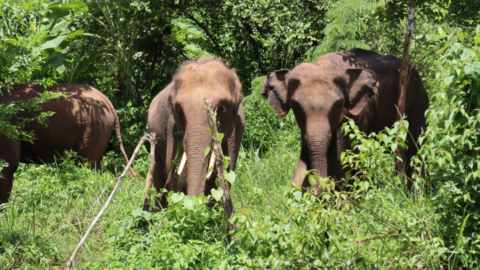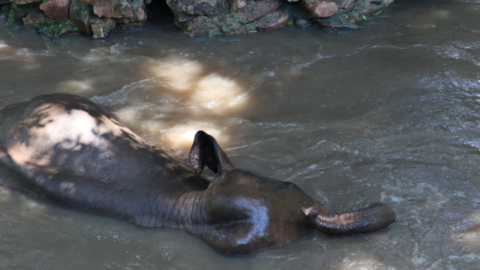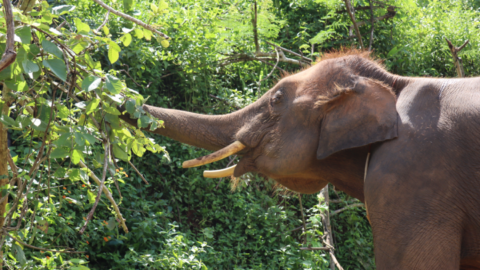Rescuing Elephants: An Interview With Thai Elephant Alliance Association’s Mr Kid
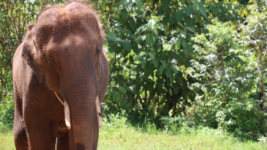
Gone are the days, when tourists in Thailand would flock to parks to ride elephants on a so-called safari, with a keeper, or mahout, strolling beside the large pachyderm brandishing a metal hook they used to prod the animal to keep it walking in the right direction.
Indeed, World Animal Protection in August last year reported that its Thai team was leading a group of specialists, nongovernment organisations, academics and government representatives in drafting elephant protection legislation to stop cruelty towards domestic elephants.
Thailand is the only nation in the world that classifies elephants as either wild or domestic. And there are 27 pre-existing laws to ensure that elephants are protected. However, when it comes to the domesticated kind, the legislation doesn’t always cover them.
Elephant riding tourism died a natural death, as people’s perception morphed from that of pure entertainment to animal cruelty, although the practice still occurs in hidden pockets.
So, the Elephant Act aims to close these legal loopholes that see riding and performance shows continue, while it also intends to prop up “elephant-friendly venues”.
Colonised forests
Thai Elephant Alliance Association vice president Mr Kid advises that the elephants used in the riding tourism industry that developed over the last decades of the twentieth century weren’t taken from the wild, but rather they were the descendants of the region’s British established logging industry.
In the second half of the nineteenth century, the British, who had colonised neighbouring Myanmar, cut a favourable deal for themselves with the Siamese monarchy, whereby rather than colonising the local peoples, it would colonise the forests for logging.
So, the Brits employed elephants, which had been domesticated by locals for centuries, to drag the teak logs they were hoarding. And at the height of its operations, the British controlled 80 percent of logging lands and the Royal Forest Department was headed by a Brit.
British logging activities in Thailand continued for more than 70 years. And after they exited, the local industry proceeded until it was banned in 1989. This left behind a heavily deforested country and a surplus of elephants that had become dependent upon people.
Rescued from harm
In March, the Thai Department of National Parks, Wildlife and Plant Conservation launched a 10-year action plan to ensure the protection of wild elephants living in national parks. The Asian elephant is endangered, and in Thailand, this is due to logging having destroyed much of their habitat.
Along with heading up the TEAA, Mr Kid runs an elephant rescue park, where he and his colleagues care for elephants that have been mistreated via ongoing employment in logging, riding parks and circuses. And while he funds his operation via short walking tours, riding is completely off limits.
Sydney Criminal Lawyers spoke to Mr Kid, the founder of Elephant Rescue Park, about the impact the COVID pandemic has had on domestic elephants, the circumstances of the park’s tusked animals before they came under his care, and the new laws designed to protect these much-loved creatures.
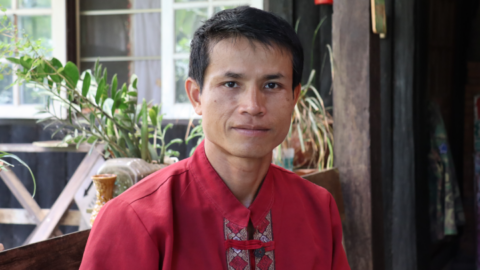
Mr Kid, your Elephant Rescue Park saved its first elephant, Jeab, from riding tourism in December 2015. Today, your centre cares for eight rescued elephants. So how does it operate?
In the beginning, in August 2015, we just provided help to elephants when we first opened. But the first elephant that belonged to us came in December.
The aim was just to provide help, free help, to any poor elephant, from the circus, from riding, from hard work or an accident.
So, why is a rescue park like this necessary?
The problem for these elephants comes from hard work and mistreatment, or for those who worked and had an accident.
Why we need to help them is that some of their owners are not able to provide the money for treatment or many elephants become disabled. So, they become unwanted elephants.
Some elephants need to work because if they don’t their owner can’t afford to take care of them, and because of Thai law, they’re not allowed to take domestic elephants up into the mountains, where it’s considered a national park or community forest.
That’s why we need to open this place to visitors, because we spend the money that we earn from them to buy trees.
In the past, tourists who came to Thailand used to ride elephants. Does this still occur?
No. It changed because of culture. We changed this because, as more and more tourists came the elephants were doing hard work for too long. I say hard work because many of the big camps had big numbers of tourists.
They used to walk for nearly 30 minutes. But when they came back, they were supposed to take a rest but they didn’t. They didn’t have that much time. When they dropped off one group, then they needed to take another.
You have eight elephants at the rescue park. Where do they come from?
Like I said, at first from August to December, we just helped elephants that belonged to other people.
But in December, we accepted an elephant that had an accident, a serious leg injury, and we tried to convince the owner to send him to the hospital, but they didn’t agree.
So, I thought, what should I do? And my solution was to care for them. So, that’s why we started to rescue elephants.
The first elephant came from an accident. The second came from the circus, a boy, who was only one and a half. He was in a training program. But we found out about it, and we went there and took him. Now he has gotten bigger.
Another boy came from the circus. Another from riding tourism. Another was from logging, another from riding, another from the circus, and the last one is from the logging industry.
And sometimes you cross the border into Myanmar to rescue elephants, I’m told.
Yes. Why? Because some Thai elephants, in the old days, back in the logging industry period, they were taken there.
Using elephants for logging was mostly by foreigners, westerners, or Europeans, let’s say. Over 100 years ago, the logging industry was created by the British.
And the logging industry involved the use of elephants?
Yes. The British demanded a contract with our government. It was legal in Thailand and Myanmar.
In the time of European colonisation, the French, British and Portuguese tried to occupy all of Asia. So, at the time, our government in Thailand had no choice.
Our government needed to sign to allow them to run this business to keep our freedom from being under their control. So, Thailand has had its own independence until now.
When they signed to run this business, they needed big numbers of elephants to do the work. Some elephants were bought by them, some were rented elephants.
But about 40 years ago, the government shutdown foresting and that’s how elephant tourism came. They shut down the national parks and the industry was cancelled with the British.
So, was the use of elephants in logging banned?
They didn’t ban it. When the British couldn’t make money here, they just went home, and they left everything, especially elephants.
Some elephants were sold to local people, mostly to the Karen. At that time, the Karen had one elephant that belonged to four, six or ten people, while some belonged to one person. It depends on their capacity.
After the logging, in the northern part of the country, these elephants became unemployed, and some became unwanted.
Tourism then came to Thailand, and they adapted their job from logging to riding.
Did the domestication of elephants happen because of the British?
No. But the British put them in the logging industry.
The domestication of elephants was thousands of years ago. Asian and Thai people have known how to use elephants for a long time.
So, domestic elephants were in India 5,000 years ago. But in Thailand, it was more than 1,000 years ago. About 400 years ago, elephants were used to fight in wars. It was called the elephant battle.
How big is the problem with elephant mistreatment these days?
Right now, in Thailand, there’s not that much. Thailand is the best country in the world now. It provides good care, treatment and takes care of elephants like a member of the family.
But sometimes, the media, or on social media, people try to beat our culture. And foreigners who come to our country, just want to change things.
For example, they try to run a campaign not to ride on elephants’ backs because they are afraid they can break the back of the elephants, which is wrong information.
Some people raise a campaign not to breed baby elephants, because when they are born, they will be trained in the circus. But this is not right. Most of the young elephants are not treated like that.
It’s the opposite. The number of domestic elephants is now decreasing sharply.
This morning we just lost an elephant, a baby one. I know this, because I am the vice president of the Thailand Elephant Alliance Association, apart from being the founder of Elephant Rescue Park.
That baby boy died today because of the disease EEHV or endotheliotropic herpesvirus.
If they banned elephant breeding, then it would be bad. Soon, maybe in 10 or 20 years, we would only have a very small number of elephants.
Right now, we have about 3,700 or so domesticated elephants, and 3,500 wild elephants in the national parks.
So, the elephants that you rescue won’t be going back to the wild?
If someone would be responsible for their care, if that elephant was guaranteed to be safe, I would agree to do that.
But about 10 or 20 years ago, there were many projects that sent these elephants back to the wild, and only 25 percent survived.
So, 75 percent died before the time that they should have. So, that’s not the solution, because these are domesticated elephants.
Some parks say it’s alright for domestic elephants. But many of them died by accident. Many died by disease. When they got sick, they needed veterinarians, especially without the skill to live in nature.
Most died because they were attacked by wild elephants.
And are there laws to protect against elephant mistreatment?
Of course. We had a law passed recently by the government. I went to parliament, to government house, to raise this with the government. And they accepted it.
It’s a good sign for Thai people and for elephant welfare. It’s for the elephants to have the freedom that they’re supposed to have, and to stop them from being hungry.
They have the right to be free to roam. They have the right to be free from sickness. That means they’re supposed to get good treatment from their owners.
They’re supposed to be free for any natural habits. That means for breeding. They have the right to do that. But some people say we shouldn’t breed domestic elephants.
And the last thing, they’re supposed to have freedom from any type of mental sickness.
So, how long have you been doing this?
I’ve been involved with elephants for a long time. I started my life in tourism almost 20 years ago. And I went to different elephant camps, and I also saw wild elephants. And I found that some places were bad to elephants.
That’s why I decided to do this, with the aim of helping poor elephants, especially the disabled.
So, now, in the park, I have two large females: one with a leg injury, she got by a logging accident, and the other one has short eyesight.
And lastly, Mr Kid, how do you see your work developing into the future?
I dream to help more elephants, as many as I can. But this is based on my status. During COVID, over the three years, there were big financial problems.
I still have a strong belief that I should care for them. I should never leave them behind, and now I aim to rescue more elephants.
The issue for us is to promote this place. When more people come to interact and learn about them, that’s how we earn more money to rescue more elephants, because to rescue one elephant costs more than 1.5 million baht.
The goal for Elephant Rescue Park is RCT. R is rescue, C is care and T is treatment.
